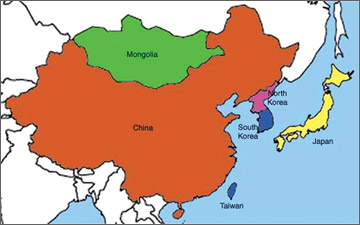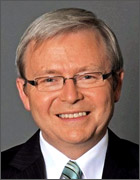Future of the expanded East Asia Summit
Text of speech by Australian Foreign Minister Kevin
Rudd at the Asia Society, New York, January 13
[Continued from yesterday]
As a Western, democratic nation of largely Judeo-Christian origin,
fully engaged in practically all of the institutions of Asia, Australia
finds itself in a unique position of experiencing the winds of change
earlier than most.
The key questions are as follows:
 • First, what does China want for the future of the regional and
global order? • First, what does China want for the future of the regional and
global order?
• Second, what does America want?
• Third, what do the rest of us in Asia want?
• Fourth, is this diverse range of national values and interests capable
of being accommodated?
• Fifth, if so, how can this be given institutional effect?
The view from Beijing
China’s attitude to its role in the global order has many parts.
First, the Chinese have long argued that modern China must operate
within an international system, rather than outside it, as it did during
the cultural revolution. For China this has been important for its own
interests (e.g. WTO accession) as well as its international standing as
a respected power.
But second, this has always been accompanied by a call for the reform
of the international system as well.
China has long objected to a uni-polar world and instead called for
‘the democratisation of international relations’ in the context of a
genuinely multi-polar world.
This has taken many forms – a new order based on three poles of the
US, China and Europe; or more recently a new order which accommodates a
new power bloc of emerging economies like the BRICS (Brazil, Russia,
India, China and South Africa).
Importantly, China has not officially embraced any programme for UN
Security Council reform that would dilute its own power against say
Japan, India or even Germany.
But the diffusion of US power through a more ‘democratic’ and
‘multipolar’ order remains a continuing Chinese objective.
Third, critically, China in the late 1970s eschewed the export of its
own ideology as part of its own international relations policy.
Imagine for a moment if China was still in the business of exporting
revolution as it was for the first half of the history of the People’s
Republic. Today, China’s so-called ‘united-front’ actively continues but
is totally engaged with the ever-growing Chinese Diaspora around the
world ‘to help build the motherland’.
Fourth, China resents any attempt to use the international system to
export Western ideology (i.e. human rights, religious belief systems or
democracy) to China. Or to hold China to account for failing to meet
these standards.
 |
|
Australian
Foreign Minister Kevin Rudd |
Fifth, China instead, through Hu Jintao, has argued for what is
called a ‘harmonious society’ at home, mandated by a ‘harmonious world’
abroad.
While many in the West may find such a formulation banal (in fact
with China, many political concepts can literally be lost in
translation) the fact remains that this represents a Chinese attempt to
accommodate a diversity of values, and a diversity of interests in the
international order, and a commitment to peaceful dialogue, not
sabre-rattling conflict, as a means of dealing with difference. I have
also long argued this concept of a harmonious world (hexie shijie) which
has deep resonance in classical Chinese philosophy, is a concept which
the West can work with.
Finally, above all, Beijing, consistent with most states, seeks to
use the international system to advance its national interests. China
wants a peaceful regional and global environment in order to grow its
own economy and in so doing achieve the overriding social objectives of
lifting its people out of poverty, giving jobs to its youth and raising
the living standards of working people so that they can enjoy a better
life, better than the mass deprivations of the past. At the same time,
China’s leadership seeks to lift international prestige as a proud
people with arguably the oldest continuing civilisation on earth.
These two factors are also core to the continuing legitimacy of the
Chinese Communist Party.
The uncertain question for many in the West is whether these national
goals, and the national and international policies that give them
effect, are either tactical or strategic.
This hangs very much on a long-standing debate of Deng Xiaoping’s
core maxim of 'hide your strength, bide your time' – a maxim that was
recently, explicitly and at some length revisited and re-explained by
China’s leading foreign and national security spokesman, State
Councillor Dai Bingguo.
Some argue that the concept of 'hide your strength, bide your time'
means that China’s current adherence to international norms consistent
with the concept of a 'harmonious world', is purely tactical – i.e. that
once China has actually obtained national wealth and power it will
increasingly act unilaterally.
Others argue that China’s acceptance of the multilateral rules-based
order is now an enduring and possibly permanent condition for China.
While there is acute debate on this in Beijing among the ever
increasing number of official and semi-official think tanks, my own view
remains very much the latter. This is because it will remain in China’s
overwhelming national interest to continue to support a multi-lateral
rules-based order that has served it so well in the past, China will
seek to influence and shape that order in the future, but not to defy
it.
Nonetheless the fact remains that many regional states are likely to
take active measures to hedge against the alternative possibility (i.e.
a more unilateral China in the future) so that they are not caught
unprepared.
The view from Washington
Henry Kissinger has made plain in his landmark work 'On China', that
a core difference between American and Chinese worldviews is American
exceptionalism. This is the view that the political and economic
freedoms that are the heart and soul of the American tradition, are not
only a birth-right for every citizen of the United States, but they also
represent a 'light on the hill' for every citizen of the world.
With this tradition there is of course a debate about means and ends
- with regime change at one end of the spectrum; moral suasion based on
international norms (such as the Universal Declaration of Human Rights)
at the other; and an activist human rights diplomacy somewhere in the
middle.
But the critical difference is this; the Chinese government
fundamentally disagrees with the universality of western perceptions of
human rights.
China argues that it is the right of all states to develop their own
form of government; that states should not pry beyond the borders of
other states as this offends national sovereignty which remains a
cornerstone of the international system; and that in China’s case many
'Western political values' are deeply incompatible with Chinese values,
not only for post-1949 China, but throughout China’s 2000 year old
Confucian tradition.
Second, beyond human rights, the United States still sees itself, as
do most of its friends and allies, albeit with varying degrees of
explicit enthusiasm, as the ultimate strategic backstop of the current
global and political rules-based order. From Korea, to Kosovo, to Kabul,
this has been a constant since the Second World War.
There are obvious tensions within this tradition: when to intervene
and when not to; whether all such interventions should be authorised by
the UNSC because in the case of Iraq, this was spectacularly not the
case; and critically whether the US continues to have the global
military capacity and the national political will to intervene in
international theatres way beyond its immediate spheres of national
interest. To be continued
|



